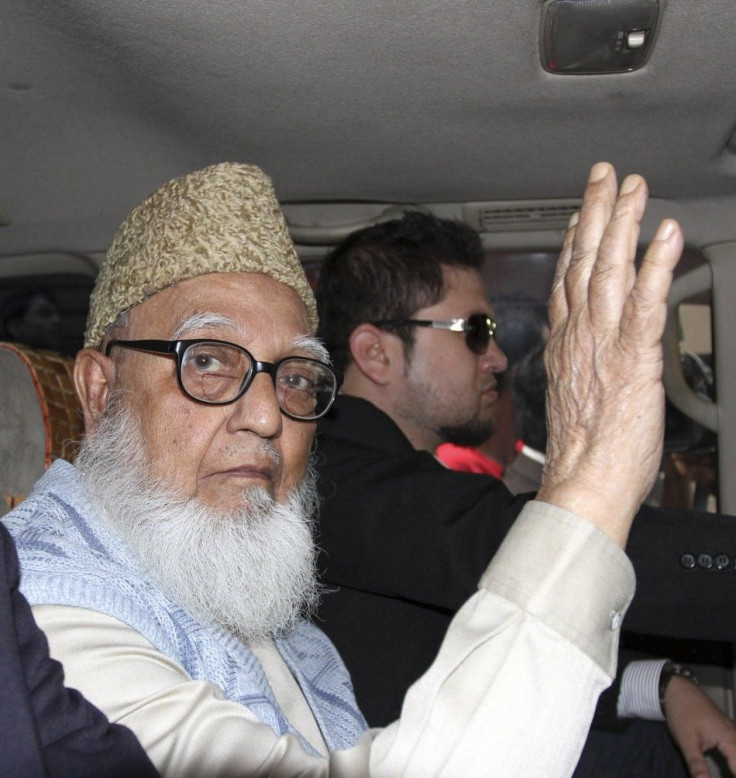Better Late Than Never: 91-Year Old Bangladesh War Criminal Gets 90 Years In Jail

Bangladesh’s Jamaat-e-Islami (Jamaat), the largest Islamist party in the country, has called for a nationwide general strike on Tuesday to protest the 90-year prison sentence its former boss received after his conviction of war crimes connected to the 1971 war of independence.
Ghulam Azam, who is now 91 years old, was given what amounts to a life term by the International Crimes Tribunal, which determined that he was guilty of all five principal charges leveled against him, including supervising the commission of atrocities (i.e., mass rapes and murder) against Bengali nationalists. Azam and Jamaat had opposed separation from Pakistan at the time and colluded with Pakistani military forces to squelch the rebellion and preserve a “united Pakistan.”
In a statement, the court’s presiding Justice A.T.M. Fazle Kabir said, "Jamaat-e-Islami played a foul role" during the 1971 independence war, which created the new country of Bangladesh (formerly East Pakistan), at a cost of untold million lives.
"It can be safely observed that Jamaat-e-Islami utterly failed to realize the pulse of the common people on both … historic occasions," he said, referring to the events of 1971 and the 1947 formation of Pakistan arising from the partition of the former British India, an event that Azam’s political mentor, Syed Abul A’la Maududi, also opposed.
Meanwhile, Justice Anwarul Haque described the killings committed by Jamaat during the independence war as a “massive genocide.”
”It can only be compared to the genocide committed by Nazis,” he said. “And that genocide was committed by Pakistan and their collaborators in this country.”
Referring specifically to Jamaat, Justice Kabir said: "It is a matter of great anxiety that anti-Liberation elements are still at the helm of Jamaat and hold public offices [in Bangladesh]."
He added that the government should remove extremists from within its ranks.
According to bdnews24.com, however, Jamaat members hold only two seats in Bangladesh’s 300-member parliament.
Prosecutors had been calling for the death penalty, but the court took into account Azam’s advanced age and frail health in its “lenient” sentence. Meanwhile, Jamaat claims the sentence was motivated by politics and is demanding Azam’s immediate release, citing that the convictions stemmed from the interests of the ruling, secular Awami League party. One of Azam’s defense attorneys, Abdur Razzaq, who also serves as Jamaat’s assistant secretary general, vowed to file an appeal, calling the sentence “a travesty of justice.”
Current Jamaat members have been protesting in the streets for months as an array of their former leaders have faced the war crimes tribunal. More than 100 people have died in these clashes since January. Indeed, earlier this year, two prominent Jamaat officials, Delwar Hossain Sayeedi and Muhammad Kamaruzzaman, were both sentenced to death by the war crimes tribunal.
The Awami League, which established the tribunal a few years ago to prosecute wartime “collaborators”, said they were satisfied with the verdict. “We expected the war criminals [would] get the maximum punishment. Though it didn’t happen [in this case], we are still happy with the court’s verdict,” Mahbub-ul Alam Hanif, the party’s joint general secretary, said.
Bangladesh media described Azam as “the man who once fought tooth and nail to prevent the birth of Bangladesh. He remains a figurehead for the powerful remnants and sympathizers of Pakistan in a deeply polarized society.” During the 1971 war, among other offenses, Azam is believed to have helped form the Al-Badr, a vigilante death squad comprising members of Jamaat’s student wing, the Islami Chhatra Sangha. Al-Badr is alleged to have killed scores of intellectual elites and other nationalists. The current chief of Jamaat, Matiur Rahman Nizami, faces charges that he served as a key organizer of Al-Badr.
Azam’s conviction on war crimes was somewhat unusual in that he wasn't physically present in then-East Pakistan when most of the atrocities were committed. Sensing that his side would lose the conflict, he fled to England and didn't return to what is now known as Bangladesh until 1978, when the right-wing Bangladesh Nationalist Party, a key ally of Jamaat, was ensconced in power. Azam retired from politics in 1999. (BNP is now the principal opposition party in Bangladesh).
© Copyright IBTimes 2024. All rights reserved.











